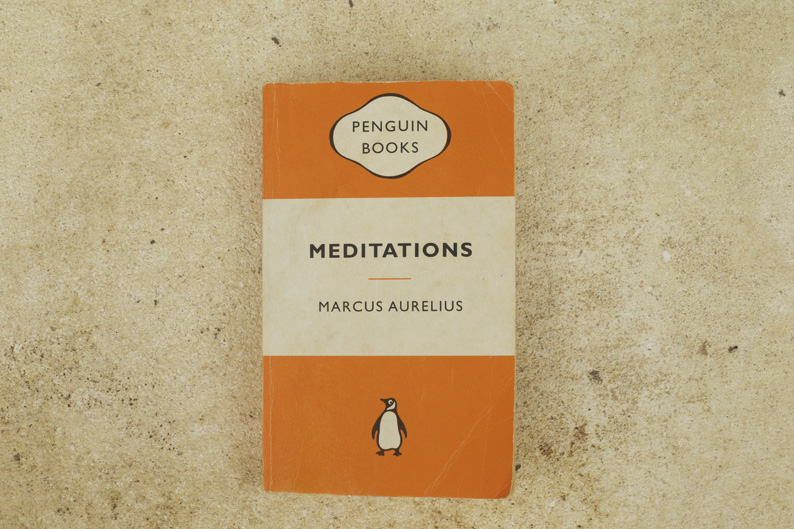Remember that to change course or accept correction leaves you just as free as you were. The action is your own, driven by your own impulse and judgement, indeed your own intelligence.
Monday, September 30, 2013
Sunday, September 29, 2013
BOOK 8 -15
It would be absurd to be surprised at a fig-tree bearing figs. Remember that there is as little cause for surprise if the world brings forth fruits such as these when the crop is there. Equally absurd for a doctor or a ship's captain to be surprised at fever in a patient or a head-wind springing up.
Saturday, September 28, 2013
BOOK 8 -14
Whenever you meet someone, ask yourself first this immediate question: 'What beliefs does this person hold about the good and bad in life?' Because if he believes this or that about pleasure and pain and their constituents, about fame and obscurity, death and life, then I shall not find it surprising or strange if he acts in this way or that, and I shall remember that he has no choice but to act as he does.
Friday, September 27, 2013
BOOK 8 -13
Constantly test your mental impressions - each one individually, if you can: investigate the cause, identify the emotion, apply the analysis of logic.
Thursday, September 26, 2013
BOOK 8 -12
When you are reluctant to get up from your sleep, remind yourself that it is your constitution and man's nature to perform social acts, whereas sleep is something you share with dumb animals. Now what accords with the nature of each being is thereby the more closely related to it, the more in its essence and indeed the more to its liking.
Wednesday, September 25, 2013
BOOK 8 -11
What is this thing in itself, in its own constitution? What are its elements of substance and material, and of cause? What is its function in the world? What is its duration?
Tuesday, September 24, 2013
BOOK 8 -10
Regret is a censure of yourself for missing something beneficial. The good must be something beneficial, and of concern to the wholly good person. No wholly good person would regret missing a pleasure. Therefore pleasure is neither beneficial nor a good.
Sunday, September 22, 2013
Saturday, September 21, 2013
BOOK 8 -8
Not possible to study. But possible to rein in arrogance; possible to triumph over pleasures and pains; possible to rise above mere glory; possible not to be angry with the unfeeling and the ungrateful, and even, yes, to care for them.
Friday, September 20, 2013
BOOK 8 -7-2
Because it is a part of universal nature just as the nature of the leaf is part of the plant's nature: except that in the case of the leaf its nature partakes of a nature which lacks perception or reason and is liable to impediment. Whereas man's nature is part of a nature which is unimpeded, intelligent, just - in duration, substance, cause, activity, and experience. But do not look to find a one-to-one correspondence in every case, but rather an overall equivalence - the totality of this to the aggregate of that.
Thursday, September 19, 2013
Book 8 -7
Every living organism is fulfilled when it follows the right path for its own nature. For a rational nature the right path is to withhold assent to anything false or obscure in the impressions made on its mind, to direct its impulses solely to social action, to reserve its desires and aversions to what lies in our power, and welcome all that is assigned to it by universal nature.
Wednesday, September 18, 2013
BOOK 8 -6
The work of the universal nature is to translate this reality to another, to change things, to take them from here and carry them there. All things are mutations, but there is equality too in their distribution. All is familiar: no cause then for fear of anything new.
Tuesday, September 17, 2013
BOOK 8 -5
First do not be upset: all things follow the nature of the Whole, and in a little while you will be no one and nowhere, as is true now even of Hadrian and Augustus. Next, concentrate on the matter in hand and see it for what it is. Remind yourself of your duty to be a good man and rehearse what man's nature demands: then do it straight and unswerving, or say what you best think right. Always, though, in kindness, integrity, and sincerity.
Monday, September 16, 2013
Sunday, September 15, 2013
BOOK 8 -3
Alexander, Julius Caesar, Pompey - what are they to Diogenes, Heraclitus, Socrates? These men saw reality, its causes and its material, and their directing minds were their own masters. As for the former, they were slaves to all their ambitions.
Saturday, September 14, 2013
BOOK 8 -2
Ask yourself this about each action: 'How does this sit with me? Shall I regret it?' In a short while I am dead and all things are gone. What more do I want, if this present work is that of an intelligent and social being, sharing one law with god?
Friday, September 13, 2013
BOOK 8 -1
This too is counter to pretension, that you have lost the chance to live your life, or at least your adult life, as a philosopher: indeed it has become clear to many, yourself included, that you are far from philosophy. You are tarnished, the: difficult for you now to win the reputation of a philosopher, and besides your station in life is a contrary pull. So if you have a true reputation, and be satisfied if you can just live the rest of your life, whatever remains, in the way your nature wishes. You must consider, then, what those wishes are, and that in all your wanderings you have nowhere found the good life - not in logic, not in wealth, not in glory, not in indulgence: nowhere. Where then is it to be found? In doing what man's nature requires. And how is he to do this? By having principles to govern his impulses and actions. What are these principles? Those of good and evil - belief that nothing is good for a human being which does not make him just, self-controlled, brave, and free: and nothing evil which does not make him the opposite of these.
Thursday, September 12, 2013
BOOK 7 -75
The nature of the Whole set itself to create a universe. So now either everything that comes into being springs from that as logical consequence, or even the primary aims to which the directing mind of the universe sets its own impulse are irrational. Reminding yourself of this will help you to face much with greater tranquility
Wednesday, September 11, 2013
BOOK 7 -74
No one tires of receiving benefit: and action in accordance with nature is your own benefit. Do not then tire of benefit gained by benefit given.
Tuesday, September 10, 2013
BOOK 7 - 73
When you have done good and another has benefited, why do you still look, as fools do, for a third thing besides - credit for good works, or a return?
Monday, September 9, 2013
BOOK 7 -72
Whatever the rational and social faculty finds neither intelligent not to the common good it judges, with good reason, beneath itself.
Sunday, September 8, 2013
BOOK 7 -71
Its ridiculous not to escape from one's own vices, which is possible, while trying to escape the vices of others, which is impossible.
Saturday, September 7, 2013
BOOK 7 - 70
The gods, who are free from death, do not resent their need throughout all the length of eternity to tolerate in such numbers such worthless creatures as me: they even care for them in all sorts of ways. And do you, with the merest time before your exit, refuse to make the effort - and that when you are one of the worthless creatures yourself?
Friday, September 6, 2013
BOOK 7 -69
Perfection of character is this: to live each day as if it were last, without frenzy, without apathy, without pretense.
Thursday, September 5, 2013
BOOK 7 -68
Live through your life without pressure and in the utmost contentment, even if all are clamouring what they will against you, even if wild beasts are tearing off the limbs of this poor lump of a body accreted round you. What in all this prevents the mind from preserving itself in tranquility, in true judgement of circumstance and readiness to use any event submitted to it? So that Judgement says to Circumstance: 'This is what you really are, however different you may conventionally appear'; and ready Use says to Event: 'I was looking for you. I always take the present moment as raw material for the exercise of rational and social virtue - in short, for the art of man or god.' Because a god or a man can assimilate anything that happens: it will not be new or hard to handle, but familiar and easy.
Wednesday, September 4, 2013
BOOK 7 -67
The way nature has blended you into the compound whole does not prevent you drawing a boundary around yourself and keeping what is your own in your own control. Always remember this: remember too that the happy life depends on very little. And do not think, just because you have given up of becoming a philosopher or a scientist, you should therefore despair of a free spirit, integrity, social conscience, obedience to god. It is wholly possible to become a 'divine man' without anybody's recognition.
Tuesday, September 3, 2013
BOOK 7 -66
How do we know that Telauges' character did not make him a better man than Socrates? It is not enough that Socrates died a more glorious death, that he argued more skillfully with the sophists, that he showed greater endurance in spending a whole night out in the frost, that he was braver in his decision to refuse the order to arrest Leon of Salamis, that he 'swaggered in the streets' (though one could well question if this last is true). No what we need to investigate is the nature of Socrates' soul. We should ask whether he was able to be content with a life of justice shown to men and piety to the gods; neither condemning all vice wholesale nor yet toadying to anyone's ignorance; not regarding anything allotted to him by the Whole as misplaced in him or a crushing burden to endure; not lending his mind to share the poor passions of the flesh.
Monday, September 2, 2013
Sunday, September 1, 2013
BOOK 7 -64
Whenever you suffer pain, have ready to hand the thought that pain is a moral evil and does not harm your governing intelligence: pain can do no damage either to its rational or to its social nature. In most cases of pain you should be helped too by the saying of Epicurus: 'Pain is neither unendurable nor unending, as long as you remember its limits and do not exaggerate it in your imagination.' Remember too that many things we find disagreeable are the unrecognized analogues of pain - drowsiness, for example, oppressive heat, loss of appetite. So when you find yourself complaining of any of these, say to yourself, "You are giving in to pain.'
Subscribe to:
Posts (Atom)




















++October:November+2006+japanese+tombo+pen+on+off-white+paper.jpg)








